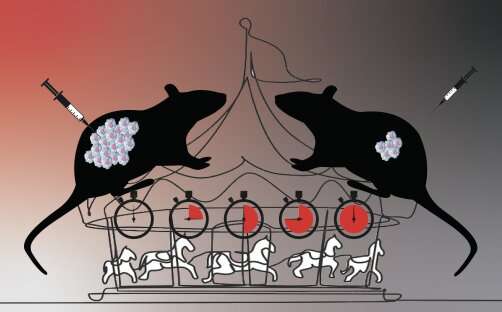A 'smashing' solution for cancer therapy

Sometimes too much of a good thing is not good at all. Inhibiting the function of the PD-1 protein, which blocks immune function, has shown high therapeutic efficacy in cancer immunotherapy. However, when this function is inhibited for an extended period of time, autoimmune diseases may develop.
Now, researchers at Kyoto University have developed a cancer therapy model in which existing medication can be used to transiently degrade and reduce the protein responsible for programmed cell death.
"We constructed a cancer therapy model in which endogenous PD-1 on immune cells in mice can be degraded for only a necessary period of time," says lead author Chie Naruse.
Naruse's team utilizes the small-molecule-assisted shutoff—or SMASh—degron system in both cultured cells and mice in vivo after introducing the medically-approved protease inhibitors asunaprevir and grazoprevir. SMASh tags are used as markers for proteolysis in the degron system, where they are fused to the PD-1 protein. This approach is effective in demonstrating the reduction of PD-1 in specific T cells after drug administration.
"Cancer cell growth was also suppressed in wild-type mice in which immune cells were replaced with those from knock-in mice," the author adds.
The method, however, may require some tweaking. Some older knock-in mice were observed to develop mild autoimmune diseases without the introduction of either inhibitor. Naruse concludes, "We are now working on an improved system in which PD-1 degradation does not occur without drug administration, possibly leading the way to a simpler treatment for cancer."
The research was published in NAR Cancer.
More information: Chie Naruse et al, A degron system targeting endogenous PD-1 inhibits the growth of tumor cells in mice, NAR Cancer (2022). DOI: 10.1093/narcan/zcac019





















